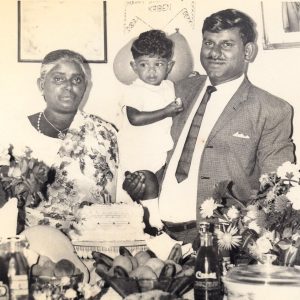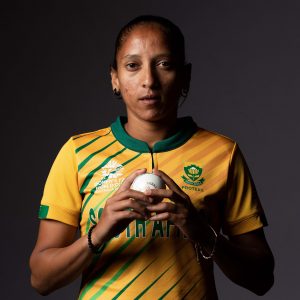How Dinesha Devnarain got her ideal job
The former Proteas player has a complicated relationship with cricket, which has both given and taken from her. But her new job is breathing life into women’s cricket in South Africa.
Author:
10 July 2020

When her appointment as head coach of both the South African Women’s Under-19 side and the Women’s National Academy was announced, the general consensus among those who know their women’s cricket was that Cricket South Africa (CSA) may well have had Dinesha Devnarain in mind when they created the dual post.
But it took the then KwaZulu-Natal Women’s team coach applying for the “wrong job” to get it.
Devnarain admits that she was mostly only ruffling feathers when she applied to coach the KwaZulu-Natal Men’s Under-19 side, but then someone at CSA had the foresight to suggest a position made for her as an alternative.
Make no mistake, as the first woman in the province to attain a level three coaching certificate (and only the eighth in the country), the former Proteas allrounder is more than qualified to get a bunch of Under-19 boys flying in formation.
As she likes to say, she coaches a sport, not gender. But when it comes to this particular gig, even those self-styled social media philosophers are right for once when they say what is yours won’t miss you.

With South African cricket still grappling with its version of Rudyard Kipling’s twin impostors – transformation and women’s cricket – Devnarain’s appointment comes with the obligatory label of first black female coach in the national structures.
Yet as critical as conquering that frontier is, more important is how perfect she is for the position. Ever since she began by giving boys the hurry-up bowling with a tattered tennis ball in the dusty streets of Bakerton in Springs, east of Johannesburg, every step of Devnarain’s journey feels as though it was in preparation for where she is now.
The 31-year-old is ideal for the position, which is effectively as an intermediary between provincial and international cricket for several reasons emanating mainly from the experiences that saw her make the KwaZulu-Natal Under-19 team as a grade 7 pupil and retire as a Proteas player at just 28.
Arrested development
With her story basically that of a child prodigy – she began playing with women from around the age of 11 and in boys’ teams all the way up to Under-17 – who never quite hit the peaks her early start had forecast, few people are in a better position to address that arrested development as she does with her prospective charges.
Related article:
“I played for my country [in 29 one-day internationals and 22 Twenty20 Internationals over eight years] but I felt like I couldn’t do the best that I could for them,” she explains. “My performances didn’t match and I asked myself if that was going to be my career, where I kept making team after team but not contributing the way I would have liked.
“Personally, I felt I wasn’t delivering the standards I should have been delivering at that level. In terms of work ethic and professionalism, everything was on point. But the performances weren’t showing.
“I’ve had time to think about it, but I can’t really say what it was. Maybe then I had a lot of mental issues to deal with and I chose not to, thinking things would get better. If there is one thing I regret from my playing days, it’s tackling those issues stopping my performance.
“I think that’s what made me go into coaching, because if I see something like that again I want to be in a position to help the individual, because that was a very difficult period for me as well. It’s been a long journey here for me, and now I’m in a position to help others because of coaching.”
A difficult relationship with cricket
A significant part of the mental issues Devnarain refers to as a hindrance to being the best she could be were how she sometimes resented the game. While she obviously loves cricket, playing it around the world not only meant it kept her away from family but she was also not there for loved ones when they died.
Devnarain says she lost a staggering five family members between 2010 and 2014. “I lost my dad first in 2010. Three months later, it was his sister … Then my mum’s sister, my sister and in 2014, it was my granny.”
In her father Jay, who suffered renal failure almost immediately after Devnarain made her Proteas debut in 2008, she lost her greatest supporter. Her sister Felisha’s death – in a nine-car pile-up in Bergville at just 21 – occured while she was at the World Cup, which necessitated her return from India.
Devnarain’s father – who left life as a businessman in Bakerton for Chatsworth in Durban, for his family’s safety after crime and violence escalated in the area – heavily influenced her career.
Related article:
Having overseen her graduation from street cricket by enrolling her in mini cricket, he was ever-present. He was the one who suggested she play with the boys to develop her game, giving up his last cent to see that she got to practice. He promised he’d be there the day she made what turned out to be a “bittersweet” Proteas debut owing to the onset of his illness.
Her “family rebel” sister left for Cape Town with her truck-driver boyfriend and never came back. They hit a stationary truck in poor visibility, causing the pile-up in which she died.
“Maybe this forms part of the answer of why my career didn’t take off the way I would have liked it to. Those four years broke me into pieces, I don’t know how I got through it. I can only think that maybe it was a higher power that helped me.
“Actually, after my sister passed on I didn’t want to play cricket anymore. I said I’m done with the game because I was on tour when my dad, gran and sister passed on. I just felt cricket was taking away from me and I was so angry and depressed.”
Will bat, bowl and sometimes even spin
Having decided not to give up cricket, Devnarain channelled her pain into her performance in a season in which she averaged “close to 98” with the bat. Those numbers are significant because she started out as an opening bowler who self-taught herself into a top-order batter at provincial level en route to becoming an international allrounder.
Ending up an offspinner came almost completely by accident. “Because younger, more pacier and skilful bowlers were coming through, I kind of left that and focused on the bowling. But then came a time when we needed an offspinner in the team, and because I used to bowl it to the girls in the nets to keep fit, I said it’s something that I do.
“Then the coach said let’s go for it. The first time I bowled offspin in a match was against Bangladesh, and I bowled something like 10 overs on the trot.”
Being a team dogsbody who has also been captain rounded Devnarain off in a way most coaches aren’t. Most coaches are ex-bowlers or batters, a preference which tends to show itself in how the team is structured.
Having played most roles will have better prepared Devnarain to have her finger on the team’s pulse, especially in the women’s environment, where they haven’t reached the level of a specific skills coach for each aspect of the game.
Blocking the talent drain
With her new coaching role nestled between the largely amateur provincial ranks and the Proteas, as well as the school-leaving Under-18s and the professional ranks, Devnarain has the unenviable task of blocking the talent drain that happens in all sporting codes at that level, particularly in women’s sport.
And because the Proteas only hire 14 women, Devnarain suddenly has the pressure of convincing players to press on with the idea of being a professional at a time when the bottleneck to the top is encouraging them to go and study for a “real” job.
“It is pressure, the girls at school are looking to make career choices and your job is to help create future Proteas through the academy,” she acknowledges. “But unfortunately there are no contracts at provincial level.

“So there you’re working with a tricky bunch, because they want to break through and there are only 14 contracts for players in the country. Now they have to balance wanting to play for their country and still having a future, so it’s difficult explaining to them that technically they’re all there for one or two spots in the team.”
But having managed to get as far as the Proteas team from an environment that was even more primitive than that of her prospective charges, not to mention recently producing Nonkululeko Mlaba, who was named International Women’s Newcomer of the Year, and Nondumiso Shangase for this year’s women’s T20 World Cup team, it should be a relatively easy sell.
A consummate juggler
Another part of the sales pitch could be that the game can be a way for her charges to get an education, Devnarain having got her human resources and financial management degrees through cricket bursaries.
As a result, for as long as she can remember she’s always juggled her studies with playing the game. “It’s extremely difficult because I had to make a lot of sacrifices in terms of socialising, which at that age was the thing to do.
Related article:
“I had to have longer nights and earlier mornings, I had to say no to a lot of things and I had no me-time. Somehow I made it work, because I always say if you really want something, the only person in charge of that decision is you. So, the choices you make are very important.”
The ability to juggle responsibilities should come in handy in Devnarain’s dual role coaching the Women’s Under-19 team and running the academy.
A custodian of the game
Despite the hard work that lies ahead, especially with the Covid-19 delays to getting to work “outside on the field”, Devnarain is excited to be on this historic path. “I’m extremely blessed and privileged to have this opportunity. It’s history in women’s cricket because we’ve never had this position before.
“I’ve always wanted to be a custodian of the game and I’ve always wanted to tell a story that people could look up to and be inspired. Now I’m in a position to change lives and make careers. I’ve experienced so much in so many spectrums of my life that I can help a lot of individuals.
“I’m definitely going to relish this role, coach by heart like I’ve always done and hopefully the results will take care of themselves. I just have to strip myself down and share with the girls, because if they associate with you they’ll give you a lot more.”



